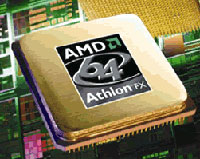AMD suffers 4Q net loss due to ATI Technologies acquisition
Struggling chip-maker Advanced Micro Devices Inc. said Thursday its fourth-quarter net loss widened, partly due to a huge goodwill impairment charge related to its $5.6 billion acquisition of graphics chip-maker ATI Technologies Inc.

AMD posted a net loss of $1.77 billion, or $3.06 per share, compared with a loss of $576 million, or $1.08 per share, in the quarter a year earlier, the AP reports.
Advanced Micro Devices, Inc. is an American manufacturer of semiconductors based in Sunnyvale, California. The company was founded in 1969 by a group of former executives from Fairchild Semiconductor, including Jerry Sanders, III, Ed Turney, John Carey, Sven Simonsen, Jack Gifford and three members from Gifford's team, Frank Botte, Jim Giles, and Larry Stenger. The current chairman and CEO is Dr. Héctor Ruiz and the current president and chief operating officer is Dirk Meyer.
AMD is the world's second-largest supplier of x86 based processors and the world's third largest supplier of graphics cards and GPUs, after taking control over ATI in 2006. AMD also owns a 21% share of Spansion, a supplier of non-volatile flash memory. In 2007, the company ranked eleventh among semiconductor manufacturers.
AMD started as a producer of logic chips in 1969, then entered the RAM chip business in 1975. That same year, it introduced a reverse-engineered clone of the Intel 8080 microprocessor. During this period, AMD also designed and produced a series of bit-slice processor elements which were used in various minicomputer designs.
During this time, AMD attempted to embrace the perceived shift towards RISC with their own AMD 29K processor, and they attempted to diversify into graphics and audio devices as well as EPROM memory. It had some success in the mid-80s with the AMD7910 and AMD7911 "World Chip" FSK modem, one of the first multistandard devices that covered both Bell and CCITT tones at up to 1200 baud half duplex or 300/300 full duplex.
While the AMD 29K survived as an embedded processor and AMD spinoff Spansion continues to make industry leading flash memory, AMD was not as successful with its other endeavors. AMD decided to switch gears and concentrate solely on Intel-compatible microprocessors and flash memory. This put them in direct competition with Intel for x86 compatible processors and their flash memory secondary markets.
Subscribe to Pravda.Ru Telegram channel, Facebook, RSS!


